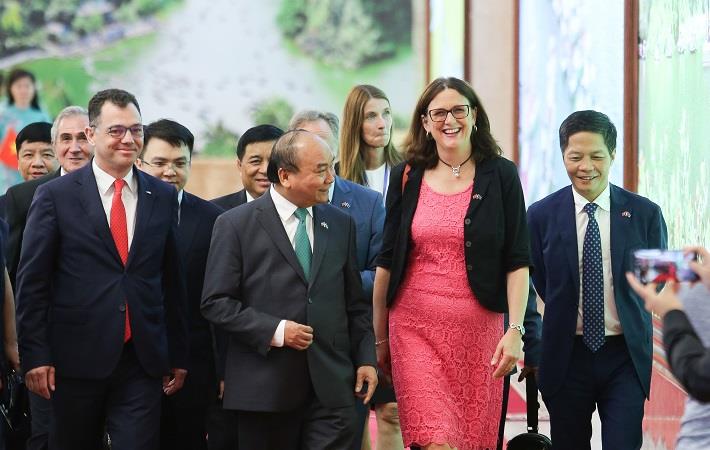
By Subir Ghosh
The European Union (EU) signed a Free Trade Agreement (FTA) and an Investment Protection Agreement (IPA) with Vietnam on Sunday. The implementation of the Vietnam–EU Comprehensive Partnership and Cooperation Framework Agreement (PCA) will result in tariff reductions on an overwhelming 99 per cent of goods between the EU bloc and Vietnam.
The deal, which will now be presented to Vietnam's National Assembly for ratification and the European Parliament for its consent, as well as to the respective national parliaments of the EU member states in the case of the IPA, was signed in Hanoi by the EU Trade Commissioner Cecilia Malmström and Vietnam's minister for industry and trade Tran Tuan Anh.
The agreements are an integral part of the framework established by the EU-Vietnam Partnership and Cooperation Framework Agreement, which would govern overall bilateral relations in areas, including development cooperation, peace and security, trade and investment, judicial cooperation, social affairs, good governance, rule of law and other issues of common interest. Both sides also agreed on the importance to ensure the implementation of the obligations under the Trade and Sustainable Development chapter of the trade agreement.
Significantly, the EU-Vietnam deal came just two days after the EU and South American bloc Mercosur (an economic and political bloc comprising Argentina, Brazil, Paraguay, Uruguay and Venezuela) agreed a free-trade treaty following two decades of talks. In Asia, the EU already has trade pacts with South Korea, Japan and Singapore, and is in talks with Indonesia, Malaysia, the Philippines and Thailand. The EU-Singapore agreement is likely to come into force later this year.
Vietnam too, for its part, has already signed about a dozen free trade pacts, including the Comprehensive and Progressive Agreement for Trans-Pacific Partnership (CPTPP)—an 11-country trade deal that will slash tariffs across much of the Asia-Pacific.
Both developments, particularly the one between the EU and Vietnam, will be keenly watched by India, especially its textiles and apparel industry which has been given a run for its money by Vietnam. Negotiations over an FTA between India and the EU were launched in 2007 and suspended in 2013. India would now want to ink that deal at the soonest possible.
Vietnam's Agreement
Bilateral trade and investment negotiations between the EU and Vietnam were launched in 2012 and concluded last year. The EU's agreements with Vietnam are the second (following those with Singapore) to have been concluded with a Southeast Asian country. The trade and investment agreements are governed by the EU-Vietnam Framework Agreement on Partnership and Cooperation (PCA) that entered into force in October 2016. Vietnam currently enjoys trade preferences with the EU under the Generalised Scheme of Preferences (GSP).
The EU-Vietnam agreement will eliminate 99 per cent of tariffs, although some will be cut over a 10-year period and other goods, notably agricultural products, will be limited by quotas. The agreement is also expected to open up public procurement and services markets, such as for the postal, banking and maritime sectors in Vietnam.
"The European Commission and the Government of the Socialist Republic of Viet Nam welcome the signature of the Free Trade Agreement and the Investment Protection Agreement," Malmström and Tuan Anh said in a joint statement on Sunday. "Both sides share a strong commitment to the effective implementation of both agreements and are cooperating closely to ensure full compliance with the obligations under these agreements." The EU said it will "support Vietnam through technical assistance in order to define and follow up on an implementation plan to facilitate the necessary reforms and adjustments, including in areas such as non-tariff barriers."
The EU is Vietnam's second-largest export market after the United States (US), with main exports including apparel and footwear products. In 2018, Vietnam exported $42.5 billion worth of goods and services to the EU, while the value of imports from the region was $13.8 billion, according to official data. According to the Vietnamese government, the EVFTA would boost EU exports to Vietnam by 15.28 per cent and those from Vietnam to the EU by 20.0 percent by next year. The trade deal is expected to boost Vietnam's gross domestic product (GDP) by 2.18-3.25 per cent annually in another four years and by 4.57-5.30 per cent annually between 2024-2028, the government said. (WE)
Fibre2Fashion News Desk – India